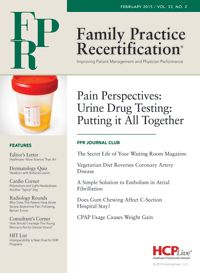Publication
Article
Family Practice Recertification
3 Minutes of Sprint Interval Training
Author(s):
Just 3 minutes of sprint interval training per week may improve cardio-metabolic factors in diabetic adults.

Frank J. Domino, MD
Review
Gillen JB, Percival ME, Skelly LE, Martin BJ, Tan RB, et al. (2014) Three Minutes of All-Out Intermittent Exercise per Week Increases Skeletal Muscle Oxidative Capacity and Improves Cardiometabolic Health. Plos One: 2014; 9(11):e111489
Study Methods:
Fourteen overweight or obese but otherwise healthy men and women (7 in each group aged 29 ± 9 years of age and BMI = 29.8 ± 2.7kg/m2) participated in this unique form of training. It involved 18 sessions over 6 weeks using a cycle ergometer. Each session began with 2 minutes of warm-up followed by a 20 second “all out sprint” on the ergometer.
Between each sprint session, each was given 2 minutes of recovery time (20 seconds intense exercise followed by 2 minutes of recovery repeated 3 times). This was then followed by 3 minutes of cool down. As a result, the subjects sprinted for a total of one minute, and the overall session lasted a total of 10 minutes.
Results & Outcomes:
Peak oxygen uptake increased by 12% after the training, and resting mean arterial pressure decreased by 7% (78 ± 10 vs. 83 ± 10 mmHg) with no difference between gender groups. A variety of physiologic factors including muscle biopsy and enzyme activity were also followed. Continuous glucose monitoring was conducted before and 48 to 72 hours after the training, which revealed a lower 24 hour average blood glucose concentration in men, but not women.
Conclusion:
Short-term interval training using a 10-minute protocol that included 2 minutes of warm-up, a total 1 minute of intense exercise interspersed with 2 minutes of recovery, and 3 minutes of cool down could stimulate improvement in physiologic factors that are linked to improved health in overweight adults.
Discussion:
Interval training has become increasingly popular over the last 10 years. The initial work by Dr. Tabata on Japanese elite athletes has been adopted by a variety of exercise protocols currently popular at local athletic facilities. Using interval training for elite athletes leads to improved aerobic as well as anaerobic capacity. This study evaluates whether it provides some benefit to obese or overweight adults to determine if physiologic markers could be improved by a very brief training session.
A variety of brief but intense exercise protocols have been evaluated over the last few years to determine if something that could be done by a poorly conditioned obese adult could improve their health. This study furthers that evaluation by studying the impact of a brief protocol (10 minutes) on metabolic and hopefully quality of life and life expectancy outcomes.
Limitations of this study are its brief time frame and its limited number of participants. Its benefits include the close scrutiny of all patients as well as the 100% retention rate of participants. Additionally, this study evaluated a very brief intervention that led to a total of 3 minutes of exercise over a 7 day period.
Dr. Tabata’s initial high-intensity interval training required 4 minutes every other day to improve outcomes in elite athletes. This study adds considerably more veracity to a physician’s claim that it only takes a little bit of activity to improve an obese or overweight patient’s metabolic health. The improvements in physiologic factors related to diabetes are very encouraging. The additional benefit of a lower mean arterial pressure was also very supportive and should urge all of us to provide patients with motivational interviewing about how little time and effort it can take to improve their health.
Will 3 minutes a week be sufficient to help people live healthier and longer? It seems unlikely. But this study shows that doing something that is only mildly aggressive could have significant outcomes. The authors plan to next study this protocol on larger populations. Until then, all patients who are obese or overweight and not exercising should be encouraged to do something. According to this study, three minutes a week should be our mantra, and maybe a first step for many into a regular exercise program.





